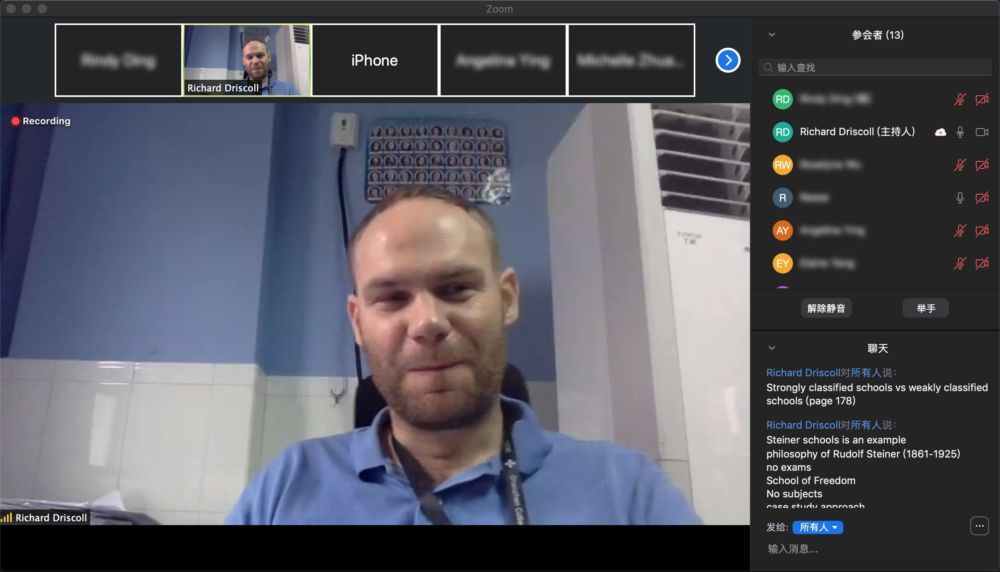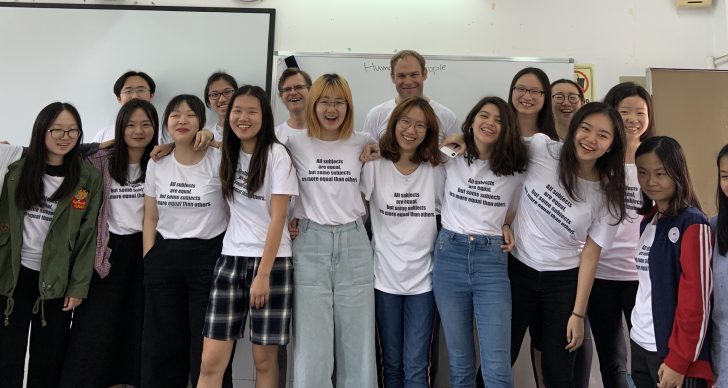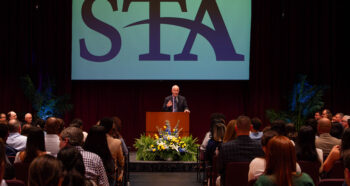Schools in China were some of the first in the world to experience shutdowns to contain Covid-19. Humanities faculty leader Richard Driscoll reflects on his experiences of learning in lockdown.
The outbreak of Covid-19 started during the Chinese New Year holiday, so like many of my colleagues at Shenzhen College of International Education, I was overseas visiting family when lockdown started. The Chinese government announced that schools should delay the return from holiday, and so we changed to online lessons for all students.
In sociology, we were starting a new unit on the sociology of education. I adapted these lessons to a collaborative research task using Moodle forums, looking at different educational contexts around the world. I would then conduct a live session using Zoom to check students’ understanding. As I gained in confidence with Zoom, I was able to develop the range of lesson activities.
By the time I was able to move back to Shenzhen, the approach changed again. Students went back to following the normal school timetable, but with a shorter lunchtime.
Luckily, we have access to all resources except for physical textbooks. We use Microsoft SharePoint and Teams, and we’ve added Moodle and Zoom.
The school’s student records system, where we can leave comments on students, has also been very helpful. It means as head of department I can give praise to students who are performing really well and engage with our pastoral team on any concerns.

A lucky break
Online learning wasn’t completely new to us. The school had thought ahead, and our faculty had already held a planning session for a SARS-like event. I also had some experience of online teaching and learning before the current lockdown.
In October 2015, I broke my leg trying to find a temple in Japan and ended up teaching online from a hospital bed in Hong Kong. I was able to engage with students through forums, and that accidental experience was useful when we started online learning full time.
I have also delivered professional development sessions on Moodle, using activities like wikis, forums and collaborating class glossary lists.
As head of humanities, my role is to support the team across geography, history, sociology and psychology, and we’ve held staff meetings through Zoom to share examples of good practice.
One of our geography teachers shared his experience of break out groups in Zoom. I then used his technique to break up a sociology class into topic groups. Each group produced a report on their area and used the share screen function to discuss it with the rest of the class.
I’ve found that lesson planning does not actually differ too much from a ‘standard’ lesson. It requires a flipped learning approach, but I have been moving more towards this model over the past few years anyway because students say they prefer it.
One thing I have had to adapt is my use of sociology puns such as “we are all heading for top Marx”. With the students on muted microphones I get no reaction – but again perhaps that’s not so different to being in the actual classroom!
New ways of checking student progress
I have been monitoring students’ learning and progress with a combination of formative and summative techniques.
For example, on a topic that I know some students might find difficult, I can ask a hinge question and then make a student the ‘host’. They answer the question and then can choose another question to develop on their answer. This approach works really well on Zoom.
Students also upload their essay plans on Moodle forums. This gives a more formal way of checking their progress and offering feedback, and because students can see each other’s work, we can also use peer assessment.
I have been massively impressed with students’ commitment to the online learning process.
Learning doesn’t stop after lessons
SCIE has more than 100 extra-curricular activities, and many have continued online. I run the Politics Club, and we held a ‘Super Tuesday’ Zoom live chat session on the US presidential primaries. A student has requested a similar session for the election of Keir Starmer as leader of the Labour Party in the UK.
Student wellbeing is being managed by our pastoral team via Zoom, WeChat, or whatever students feel most confident using. We also created a quick wellbeing survey using emojis, and cross reference it with lesson attendance to pick up any students that might need support.
The uncertainty of the situation has been the biggest challenge. As a head of department, you have a whole team to consider, and you try to look after their well-being as best you can, often without being able to give concrete answers.
I think it will have a lasting effect on how we teach. I’m already putting more online learning into the schemes of work for next year. I think it would also be wise to have an online day built into the school year as part of contingency planning for a repeat situation.
Among all the uncertainty, it is the sociology lessons that I have really looked forward to. The last time we had pupils on campus was 17 January. I am looking forward to having all my students back in the classroom again, reflecting together on the past two months.





